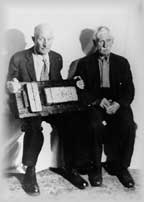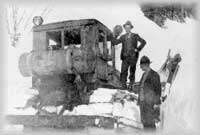 |
|
|

Prospector, miner, adventurer - Fred Marshall Wells was born in Whitefield, New Hampshire on August 4, 1861. There are conflicting reports as to why Fred ended up in British Columbia in 1882. One story tells of Fred crossing over the Rocky Mountains from Calgary on an Indian pony "just to see what lay on the other side of the mountains." Another story says he came into the Windemere area to look after a ranch owned by a fellow he met in Calgary, leaving his employer shortly after, to go prospecting. Either way, his compulsive mining career began, and Fred became one of the leaders of the Second Cariboo Gold Rush.
Full of energy and spirit, Fred was involved in a variety of mining enterprises before he came to the future site of Wells - from prospecting on the Columbia River at Spillamacheen to developing the Nickel Plate Mine near Rossland. First, he was interested in the Proserpine area in 1922, but was unable to finance it at the time. The adventure in Wells began in the same year when William C. Drake, an artist and prospector from California, ventured to Cariboo Mountain where he found a large outcropping of quartz on the surface containing gold. He sent a piece of the rock for assaying which yielded results of $3520 to a ton. Drake then met with a friend who was a broker in Seattle. The broker arranged for Fred to meet with Drake in the Cariboo to look at his find. However, Drake did not arrive at the arranged date, and after a few weeks, when Drake did arrive, Fred Wells had already made his find on Cow Mountain.
Known as the 'Father of the Cariboo'1 , Fred was in his sixties when the Cariboo Quartz venture began. His friend, Al E. Sanders (a resident of Seattle), had taken over three thousand dollars from the surface of the famous Sanders vein on Cow Mountain, all on his own. Fred built a cabin on this mountain, and for the next four years, successfully prospected Al Sanders's claims and 7 claims adjoining. He did this by the slow method of crushing the quartz by hand and panning the pulp by washing the gravel in a pan to separate the gold. He also purchased the 3 claims known as the Rainbow Group from Sanders, as well as 5 adjoining claims owned by Charles Law and Bob Clark.
Fred's inital belief in these claims produced over three thousand dollars. With an entrepreneurial spirit, Fred purchased the Rainbow claims at the northeast end of the lake from Al in 1927. On behalf of the syndicate formed by Mr. Wells, Dr. Burnett, and Mr. Solibakke, Mr. Sanders received as payment stock in the newly formed Cariboo Gold Quartz Mining Company Ltd. on February 8, 1927. Sanders was unable to continue with further development due to poor health, but had great faith in his old friend. Fred drove the first adit into Cow Mountain in 1927 at 4,400 feet for the purpose of finding and exploring the Sanders vein which had been encountered on the surface. The Sanders vein was not encountered until 2,500 feet from the entrance; however, other gold bearing veins were discovered during tunnelling.
The original Cariboo Gold Quartz Company (CGQ), was located at the lower end of Jack of Clubs Lake, on the far side of Cow Mountain. The CGQ began as a syndicate, formed in the fall of 1926. It later became a limited company formed by Dr. Burnett, Mr. Wells, and Mr. Solibakke. Fred Wells filled the role of director, and later took the lesser position of manager in order to pursue other prospects.
While associated with the Cariboo Gold Quartz Mining Company, Fred was in charge of all development and displayed integrity to anyone who met him. Prospecting was Fred's life and in his pursuit for gold, he became a legend in mining communities. "...Fred M. Wells, the wizard of the Cariboo"2.
for more on Fred follow the arrows...
The Process | Lode vs. Placer | Two Companies | Mining Strikes | Profile of a Miner | Home | Meet the Team | Site Map
Last updated:September 8, 2000

